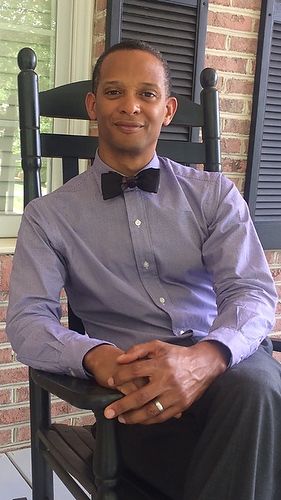The first student matriculated in Wake Forest’s Master of Arts in Liberal Studies program in fall 1985. Since then, 269 graduates have followed, pursuing their diverse interests within the University’s liberal arts curriculum. No two MALS degrees are the same, but all of them share the commonality of exploration of timeless human questions and essential human experiences. Walter Lee Johnson Jr. (MALS ’14) celebrates the program’s 30th anniversary with the following tribute.
As we mark the 30th anniversary of the MALS program, I am very grateful to Wake Forest for upholding the humanities as a worthwhile pursuit of study. Whether reading the primary source texts of Shakespeare’s plays, deconstructing the meaning of Irish prose and poetry or analyzing the influence of the French New Wave and Italian Neorealism movements on American cinema, a student in the graduate program is invited to have a meaningful conversation with the world.

Walter Johnson: The program helped me ask difficult questions of myself.
I structured my MALS degree around the dual concentrations of global and cultural studies. My coursework introduced me to new terminology and expanded my notion of citizenship. Our study of cosmopolitanism, the ideology that all human ethnic groups belong to a single community based on a shared morality, provided a framework for an analysis of global justice. We were challenged to think beyond utilitarian concerns of limited resources and to consider the ethical obligations of world citizenship.
This scholarly approach proved particularly useful as I continued my work in Africa through my church. For the past six years, I have traveled biennially to Zambia. Over time, I have concentrated on building relationships with the bush communities outside of the village of Mwandi. My local congregation, First Presbyterian Church of Albemarle, has partnered with a rural village to work on access to clean water.
When discussing the plight of people consuming unclean water, our mission partner, Pastor Percy Muleba, shared that “to a hungry man, poison is food.” He and I had moving conversations about the similarities of living in a post-colonial society and the struggles of being a racial ethnic minority in America. The dilemma resides within how we understand our obligation to others. The inability to fully embrace the humanity of another and to intimately relate beyond artificial social constructs creates societal dissonance.
From the classroom to Africa and to a MALS study tour of Venice, Italy, I found that MALS influenced my inquiry. My MALS experience stressed the value of crafting insightful questions and exploring answers in-depth. The program broadened my worldview and helped me ask difficult questions of myself, such as: If we are world citizens, how does this truth shape our identity and our moral obligations to humanity? If people actively engage in the political process on mistaken premises, is that good or bad for democracy? How can I live with integrity beyond the cliché, “Think globally, act locally?”
Our cherished motto of Pro Humanitate has reinforced my pursuit of knowledge and has inspired me to take action beyond the classroom, to continue to explore life’s meaningful questions. I carry with me a lesson from Diogenes. The ancient Greek philosopher was asked to which country he belonged. He answered, “I am a citizen of the world.”
Walter Lee Johnson Jr. (MALS ’14) lived in Albemarle, North Carolina, for 12 years before moving last spring with his wife, Dr. Yolanda Johnson, a pediatrician, and their four sons to Gwinnett County, Georgia. He has a history degree from Emory University and a master of divinity degree from Columbia Theological Seminary. These days he serves as a stay-at-home dad. For more information about the MALS program, go to mals.wfu.edu, email mals@wfu.edu or call 336.758.5232


